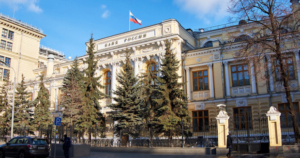
Default looms — but a sideshow to economic collapse

International credit rating agencies believe that President Vladimir Putin’s decree on foreign debt repayment means a default is all-but inevitable. The decree states that creditors from countries that have committed “unfriendly actions” against Russia can now be paid in (increasingly worthless) rubles via special accounts in Russian banks — and the Ministry of Finance is no longer obliged to pay debts in foreign currency.
By definition, a default occurs when a borrower fails to fulfill its obligations to the creditor. This can mean failing to pay the interest and the principal debt on time or in full, or not meeting the conditions of the loan agreements (including changing the specified currency).
Converting foreign-denominated debt obligations into rubles would mean a default, the chief economist at one of Russia’s major think tanks told The Bell.
Markets are almost certain that Russia will default. Government bonds due to mature in 2023 fell to record lows at the start of the week – just 29 percent of their nominal value. And U.S. investment bank Morgan Stanley predicted that they might even dip below 10 percent – a level only seen for state bonds issued by Venezuela and Lebanon. Bloomberg’s index of sovereign Russian bonds has slumped 81 percent since the start of the year. Only Belarus — down 93 percent — is performing worse.
For Russians, the word ‘default’ immediately triggers memories of the traumatic 1998 economic crisis, and the huge devaluation of the ruble. Back then, the default was caused by a sharp fall in the value of the ruble, soaring inflation, the failure of several large private banks and the forced conversion of foreign currency deposits into rubles. But things are different this time. “A rapid increase in prices, the devaluation of the ruble, reduced incomes and falling standards of living for Russians in 2022 will not be the result of any default,” said the chief economist at one of Russia’s biggest think tanks. He added that paying off debts in rubles is peripheral to what is currently happening to the broader economy.
A statement from The Bell: The risks for journalists working in Russia are extremely high as a result of a new law that punishes the spread of ‘fake news’ with up to 15 years in jail. As Russian officials refuse to describe events in Ukraine as a ‘war’, preferring the term ‘special military operation’, we believe we can no longer safely cover events in Ukraine. As a result, we’re halting all direct coverage of Russia’s ‘special military operation’ until further notice — although we will continue to report on its far-reaching economic, political and social consequences. If you notice that we’re being circumspect about our language — you’re right. We are. We believe it’s the only way to protect our journalists.



